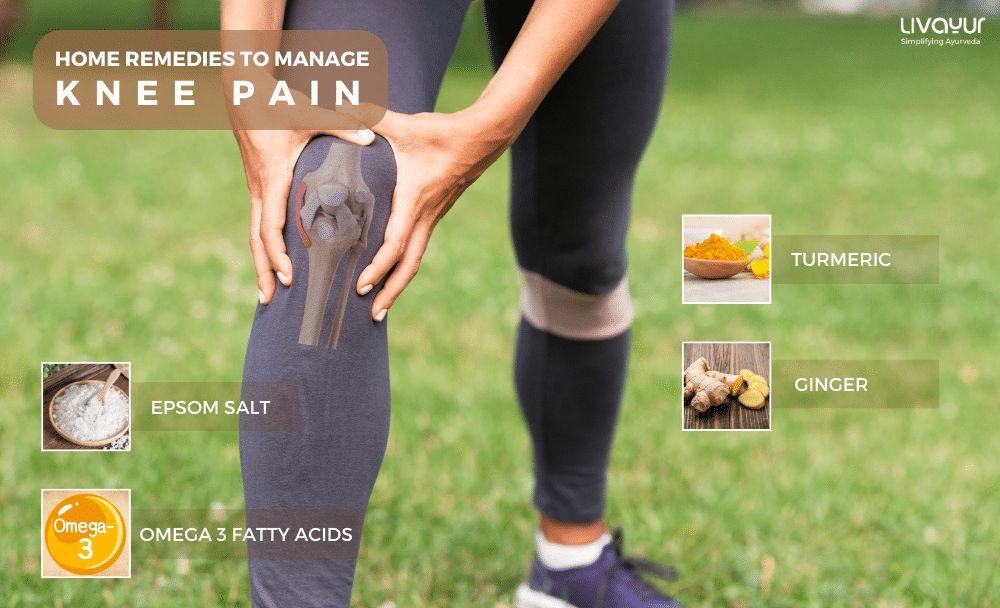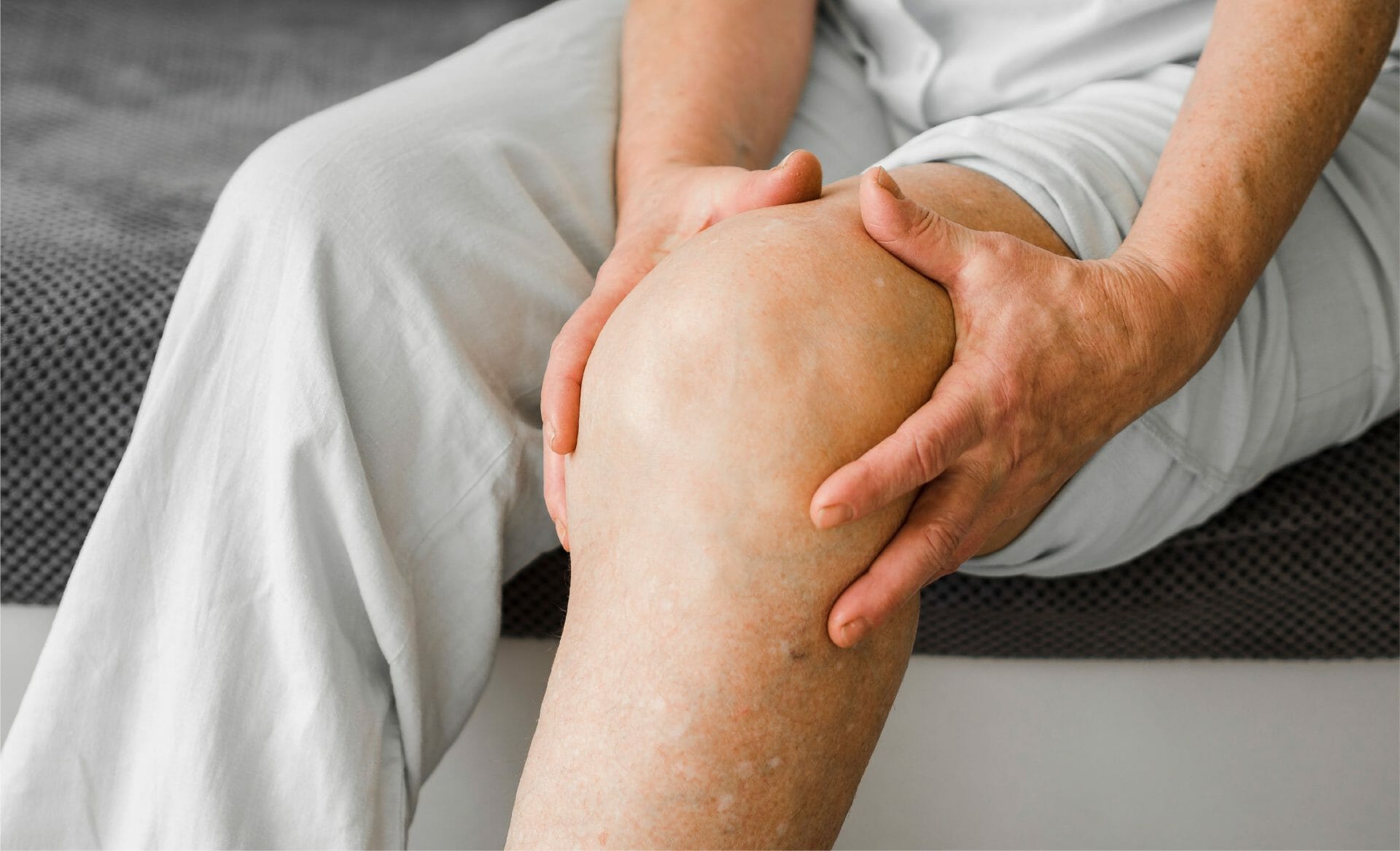
Knee pain can hinder you to perform day-to-day activities and lead a high quality of life. While medical interventions and physical therapy are essential to knee pain management, many individuals seek natural and effective home remedies to complement their treatment regimens.
This article explores 12 natural and home remedies that can help overcome knee pain and enhance mobility. These remedies, rooted in traditional wisdom and contemporary research, offer a holistic approach to managing knee discomfort and promoting overall joint health. So, let’s understand how you can take control of your knee health naturally and effectively.
Why does knee pain happen?
Knee pain is a prevalent medical condition arising from various underlying factors. Primarily, it occurs due to the complex structure and function of the knee joint. The knee is a weight-bearing joint, subject to substantial stress and strain during daily activities. Common causes of knee pain include osteoarthritis, where the protective cartilage in the joint deteriorates, leading to friction and discomfort.
Traumatic injuries like ligament sprains, meniscus tears, or fractures can trigger acute knee pain. Overuse or repetitive strain, often associated with sports or physical labor, can also contribute to knee discomfort. Furthermore, underlying medical conditions like rheumatoid arthritis or gout can affect the knee joint, resulting in pain and inflammation. [2] [3]

12 home remedies to overcome knee pain
Here are 12 remedies on how to cure knee pain at home.
- Turmeric
Turmeric contains curcumin and is known for its anti-inflammatory properties. It can help reduce knee pain when consumed regularly as part of one’s diet or in supplement form.
- Ginger
Ginger’s anti-inflammatory and analgesic properties make it a valuable ingredient for reducing knee pain. Making ginger a part of your diet or using it in herbal teas can be beneficial.
- Essential oils
Topical application of essential oils like lavender, eucalyptus, or peppermint can provide temporary relief from knee pain. It is possible due to their analgesic and anti-inflammatory properties.
- Epsom salt soaks
Soaking the affected knee in warm water with Epsom salt may help alleviate pain and reduce inflammation, thanks to the magnesium content of Epsom salt.
Also learn about Swedana detoxifying steam therapy
- RICE (Rest, Ice, Compression, Elevation)
This time-tested approach helps reduce inflammation and relieve pain. Resting the affected knee, applying ice to reduce swelling, using compression bandages, and elevating the leg can aid in the healing process.
- Heat therapy
Applying warm compresses or heating pads can aid in relaxing muscles and improving blood circulation around the knee.
- Omega-3 fatty acids
Omega-3 fatty acids-rich foods like flaxseeds and walnuts, can help combat inflammation and contribute to overall joint health.
- Weight management
Maintaining an ideal body weight can diminish the stress on your knee joints, decreasing the risk of knee pain or worsening discomfort.
- Low-impact exercises
Engaging in low-impact activities like swimming, cycling, or gentle yoga can strengthen the muscles around the knee joint and improve its stability.

- Glucosamine and chondroitin supplements
These supplements may help support joint health by promoting cartilage repair and reducing pain associated with knee osteoarthritis.
- Massage therapy
Professional massage or self-massage techniques can enhance blood flow to the knee, reduce muscle tension, and alleviate knee pain.
- Acupuncture
Traditional Chinese acupuncture involves inserting thin needles into specific points on the body, which some individuals find effective in reducing knee pain and improving joint function.
When to see a doctor?
Seeking medical attention is imperative when experiencing knee pain under specific circumstances.
- Persistent knee pain
If it lasts for an extended period, hinders daily activities, or disrupts sleep, you should visit a doctor. For those with a history of joint conditions, like arthritis, or if knee pain is recurrent, recurrent, or progressively worsening, consulting a healthcare professional is crucial to identify underlying causes and explore appropriate treatment options.
- Sudden pain
First and foremost, if knee pain is sudden, severe, and accompanied by swelling, redness, or an audible pop, it may indicate a significant injury or ligament tear, necessitating immediate medical evaluation.
- Other symptoms
If knee pain accompanies fever or shows signs of infection, numbness, tingling, or weakness in the leg, seeking prompt medical attention is preferable to rule out severe underlying conditions.
Ayurvedic management of knee pain
Ayurveda offers a comprehensive approach to managing knee pain, particularly conditions like knee osteoarthritis. Here are some ayurvedic herbs and formulations traditionally used to alleviate knee pain and promote joint health.
- Punarnavadi guggulu
This Ayurvedic formulation is renowned for its efficacy in addressing local swelling and pain. It contains Punarnava as a significant ingredient, known for its ‘Shreshtha Shothaghna‘ or anti-inflammatory properties. Research on boerhaavia diffusa, the botanical source of Punarnava, has demonstrated its anti-inflammatory and diuretic effects, making it a valuable component in managing knee pain. [1]
- Guduchi
Guduchi is a critical ingredient in punarnavadi guggulu and asthiposhaka. Guduchi can stimulate the growth of osteoblasts, enhance cell differentiation into the osteoblastic lineage, and increase bone mineralization. These properties make it beneficial in addressing the underlying factors contributing to knee osteoarthritis. [1]
- Devadaru
Devadaru is a part of punarnavadi guggulu due to its ‘shothahara‘ (anti-inflammatory) and ‘vedana sthapana‘ (pain-relieving) properties. It is particularly indicated for conditions like ‘jeerna sandhivata‘ and ‘amavata.’ Research has shown that the volatile oil extracted from Devadaru possesses anti-inflammatory and analgesic actions, making it valuable in knee pain management. [1]
- Haritaki
Haritaki is recognized for its ‘mrudu virechaka‘ (mild laxative) and ‘srotoshodhaka‘ (cleansing of channels) properties. It can help alleviate swelling by promoting the clearance of toxins and excess fluids. Additionally, Haritaki exhibits antioxidant properties, which can be beneficial in combating oxidative stress and inflammation often associated with knee pain. [1]
- Hadjod
Hadjod, also known as Cissus quadrangularis, is a traditional Ayurvedic herb known for its bone-strengthening properties. It helps heal fractures and relieve knee pain by supporting bone health and reducing inflammation. [4]
- Shallaki (Boswellia)
Shallaki, derived from the resin of Boswellia trees, is celebrated in Ayurveda for its anti-inflammatory and analgesic properties. It helps relieve stiffness and joint pain associated with knee pain and promotes collagen production, which aids in maintaining healthy joints. [5]
- VETAS (Willow Bark)
Willow bark contains natural analgesic compounds that can effectively manage knee pain, especially in osteoarthritis and lower back pain cases. It helps alleviate pain and discomfort associated with knee conditions. [6]
- Haldi
Haldi or Turmeric is a powerful anti-inflammatory herb that contains curcumin, a natural compound known for its analgesic properties. It helps reduce joint stiffness and pain and promotes collagen production. [6]
- Sunthi (dry ginger)
Dry ginger has analgesic and anti-inflammatory properties, making it an effective remedy for managing joint pain and inflammation associated with knee problems. It can provide relief from discomfort and improve mobility. [6]
- Mahanarayan oil and Mahamash oil
These oils blend various Ayurvedic herbs with a sesame oil base (mahanarayan) or black gram (mahamash). They can help reduce joint pain and swelling, strengthen muscles, and alleviate joint discomfort. [6]
- Nirgundi oil
Nirgundi oil helps pacify vata dosha, often implicated in joint pain. It has anti-inflammatory and analgesic effects, making it beneficial for maintaining joint health and reducing pain. [6]
- Eucalyptus oil
Eucalyptus oil helps reduce swelling and stiffness in joints. Its calming effects can relieve joint pain, making it a useful addition to Ayurvedic treatments for knee pain. [6]
- Castor oil
Castor oil offers analgesic actions and is particularly beneficial in treating vata-related disorders, which often manifest as joint pain. [6]
FAQs
1. Does knee pain remedy at home work?
Resting the affected knee, applying ice packs to reduce swelling, using compression bandages, and elevating the leg can help relieve pain and inflammation. Additionally, gentle stretching exercises and low-impact activities like swimming or stationary cycling can improve knee mobility and strength. In your routine, natural remedies such as turmeric, ginger, and Epsom salt soaks can help manage knee pain.
2. What are knee joint pain home remedies?
Home remedies for knee joint pain include heat therapy, where you can apply warm compresses or heating pads to relax muscles and reduce stiffness. Incorporating anti-inflammatory foods like turmeric, ginger, and omega-3 fatty acids can help. Massaging the affected area with essential oils or engaging in low-impact exercises like yoga can relieve knee joint pain. Remember that it’s necessary to consult a doctor if the pain persists or worsens.
3. What are effective knee pain relief home remedies?
Knee pain relief at home can be achieved by following a regimen that combines rest, ice, compression, elevation (RICE), and over-the-counter pain relievers. Natural remedies like turmeric, ginger, and Epsom salt soaks can also help reduce pain and inflammation. Maintaining a healthy weight and performing low-intensity exercises effectively relieve stress. However, consulting a healthcare provider for proper diagnosis and treatment is essential, especially for chronic or severe knee pain.
4. What is an effective knee swelling and pain home remedy?
An effective home remedy for knee swelling and pain is the application of ice packs or cold compresses to reduce swelling and numb pain. You can also try Epsom salt soaks to alleviate both swelling and discomfort. Resting the affected knee and elevating it can further reduce swelling. However, it’s crucial to consult a healthcare provider if swelling persists, as it could indicate an underlying issue.
5. How to get rid of knee pain fast at home?
Rest the affected knee and apply ice packs for 15-20 minutes to quickly relieve knee pain at home. Over-the-counter pain relievers can provide fast relief. Gentle knee stretches and range-of-motion exercises may also help. Remember to avoid activities that worsen the pain. While these methods can provide immediate relief, consulting with a healthcare professional is advisable to address the underlying cause of the pain for a long-term solution.
Conclusion
Knee pain can impact your daily life. Exploring natural and effective home remedies can be a valuable complement to medical treatments and physical therapy. The 12 remedies discussed in this article offer a holistic approach to managing knee discomfort, addressing inflammation, and promoting joint health.
Whether using herbal supplements like punarnavadi guggulu or incorporating anti-inflammatory foods into your diet, these strategies will empower you to take charge of your knee health. However, remember that individual responses may vary, and consulting a healthcare professional can help with comprehensive evaluation and personalized guidance.
Disclaimer
The information provided here does not intend to replace professional advice or treatment.
References
- Knee Osteoarthritis Management through Ayurveda: A Case Report. 27 June 2019
- Anterior knee pain. April 2007
- Knee pain and osteoarthritis in older adults: a review of community burden and current use of primary health care.
- A review on Cissus quadrangularis. 05 June 2017
- Clinical evaluation of Boswellia serrata (Shallaki) resin in the management of Sandhivata (osteoarthritis). 2011
- JOINT PAIN




















